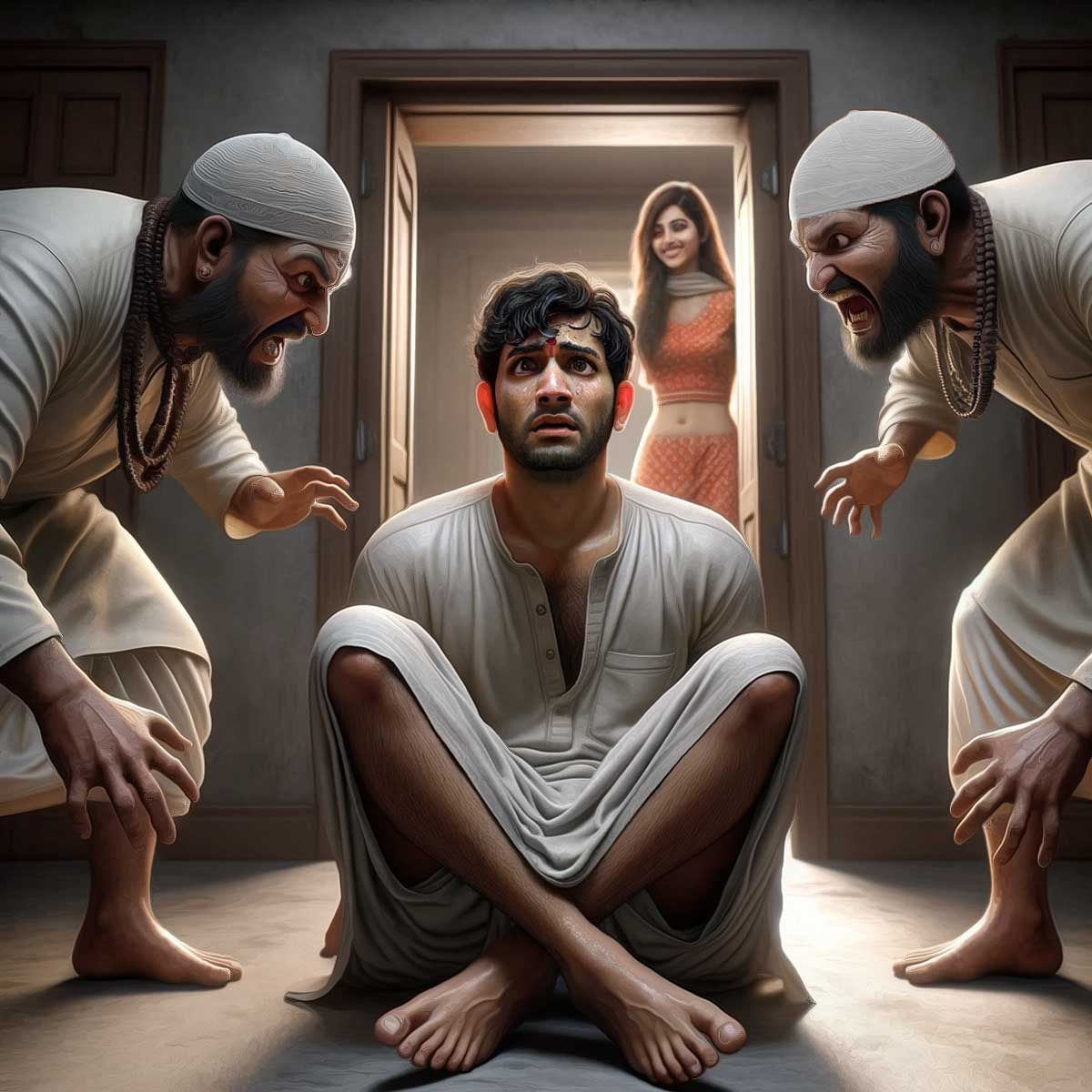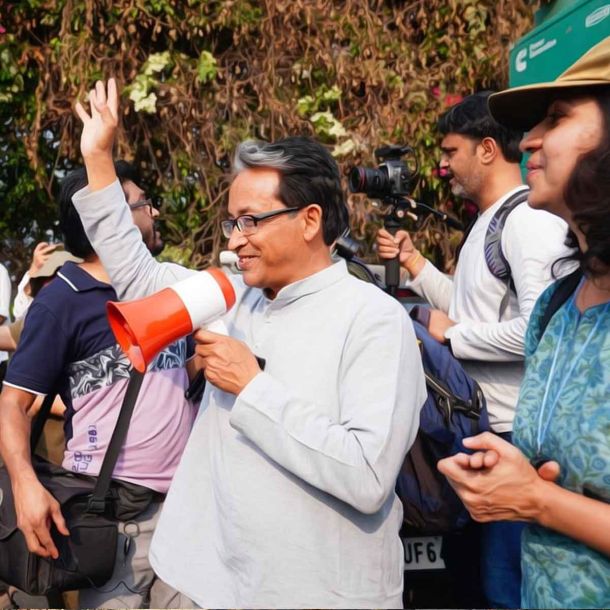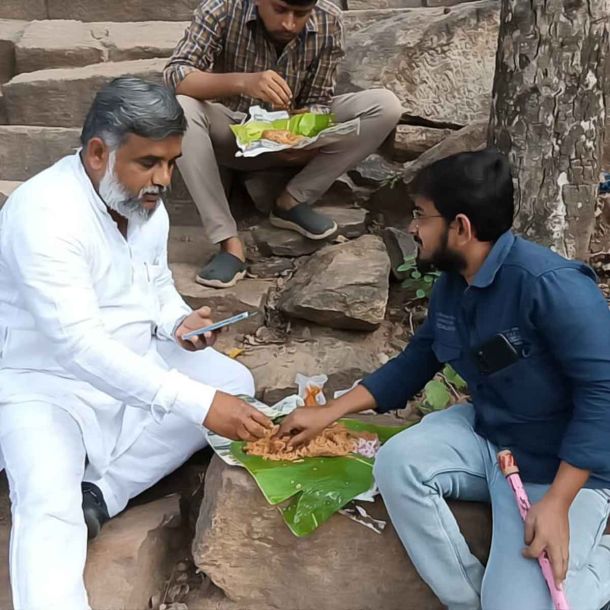MORE COVERAGE
Twitter Coverage
Satyaagrah
Written on
Satyaagrah
Written on
Satyaagrah
Written on
Satyaagrah
Written on
Satyaagrah
Written on
JOIN SATYAAGRAH SOCIAL MEDIA
"पर प्रभु, वे मेरा विश्वास नहीं बदल सके...": In Auraiya, UP, Hindu youth Rohit Kumar took his life after immense pressure from Muslim friend Sattar's family & Salman to convert to Islam and marry their daughter, a harrowing testament to religious coercion

In a heart-wrenching incident from Auraiya district in Uttar Pradesh, a Hindu youth named Rohit Kumar tragically took his own life. This devastating turn of events is reportedly linked to intense pressure exerted on him by certain individuals, pushing him towards religious conversion.
|
"A Hindu youth identified as Rohit Kumar recently committed suicide, reportedly after facing pressure from some individuals to convert to Islam." This statement, which stands at the core of the unfolding narrative, raises serious concerns about the circumstances leading up to Rohit's decision.
The complexity of the situation is further heightened by a video that surfaced online, now going viral. In this video, Rohit himself can be heard making grave allegations. He claimed that the accused, named Sattar and Salman, had embroiled him in a legal tangle based on unfounded accusations. "Rohit had stated that accused persons Sattar and Salmann had filed a ‘false case’ against him, were forcing him to marry a Muslim girl, and convert to Islam." These words, coming directly from Rohit, paint a picture of a young man caught in a web of social and legal challenges, struggling to navigate a path fraught with religious and ethical dilemmas.
Further intensifying the gravity of the situation, Rohit's family has come forward with their own set of allegations. They contend that the pressure on Rohit was not just psychological or social but also took a legal dimension. "Rohit’s family members allege that Sattar, Salman, and others filed a case against Rohit under the POCSO Act after he refused to accept Islam." This allegation, if substantiated, points towards a misuse of legal provisions to coerce someone into changing their religious beliefs, an act that challenges the very foundation of personal liberty and freedom of belief.
In addition to this, the family alleges that there was an attempt to force Rohit into a marriage that he did not consent to, solely based on religious grounds. This aspect of the case, if true, highlights a deeply concerning trend where personal choices and freedoms are being trampled upon in the name of religious conformity.
Before his tragic death by suicide on 18th November, Rohit Kumar chose to express his emotional state through a video recording, a final testament to his anguish and despair. This act of desperation, choosing to end his life by consuming poison, starkly highlights his internal turmoil and the intensity of the pressures he faced.
"However, before committing suicide by consuming poison on Saturday (18th November), Rohit expressed his emotional state through video recording." This poignant decision to document his feelings provides a heartrending insight into the depth of his suffering and the circumstances that drove him to such a drastic measure.
|
In response to this tragedy, law enforcement has initiated a proactive approach. "At present, one of the accused has been arrested, and the rest are being looked for by the Police." This development indicates a swift action by the police, emphasizing their commitment to ensuring justice is served. The arrest of one of the accused might be a significant step in unraveling the complex web of events that led to Rohit's suicide.
The formal complaint in this case was lodged at the Vidhuna police station in the Auraiya district. Sarojini Devi, Rohit's mother, filed the complaint, revealing intricate details about the relationships that might have played a crucial role in the events leading up to Rohit's death. "The mother of the deceased, Sarojini Devi, a resident of Barke Purva village has filed the complaint in which she said that Rohit knew Sattar and that they were good friends." This statement sheds light on the close association between Rohit and Sattar, suggesting a betrayal of trust which might have exacerbated Rohit's sense of despair.
As the complaint details, Sattar, along with others, allegedly tried to coerce Rohit into changing his religion as a precondition for marrying his daughter. "It is alleged that Sattar wanted to get his daughter married to Rohit. Therefore, he along with Salman and Bunty Khan pressurized Rohit to accept Islam." This claim, if substantiated, paints a distressing picture of religious coercion and societal pressures impinging upon individual freedom of choice and belief.
The situation reportedly escalated when Rohit refused to renounce his Hindu faith. "The family of the deceased allege that when Rohit refused to leave the Hindu religion, the accused lodged an FIR against him at Sahar police station in Auraiya on 6th September 2023." This allegation, if true, indicates a manipulative use of the legal system to exert pressure on Rohit, further entangling him in a complex and potentially hostile situation.
Indeed, the relationship between Rohit Kumar and Sattar, as described in the complaint, reveals a significant backstory that adds depth to the narrative. "The duo used to visit each other often. Rohit also used to go to his house. In the course of visits, he got acquainted with Sattar’s daughter." This detail is crucial as it establishes a close and ongoing relationship between Rohit and Sattar, transcending mere acquaintance and bordering on friendship.
The frequent visits between Rohit and Sattar, and Rohit's acquaintance with Sattar's daughter, frame the ensuing events in a more personal context. It suggests that Rohit's interactions with Sattar and his family were part of a deeper, more intertwined relationship. Such a connection could have potentially made the alleged pressure exerted on Rohit to convert to Islam and marry Sattar's daughter more impactful and distressing for him.
This background of regular visits and growing familiarity is essential in understanding the full scope of the situation. It points to a gradual build-up of relational dynamics that might have influenced Rohit's emotional and psychological state. Knowing that he was allegedly pressured by someone he considered a friend, and within the context of a relationship that extended to the family, adds layers of complexity to the tragedy. It underscores the betrayal and the interpersonal conflict that Rohit might have felt, trapped between his personal beliefs and the expectations imposed upon him.
The case surrounding Rohit Kumar's tragic suicide in Auraiya, Uttar Pradesh, further unravels to reveal a series of distressing events, involving allegations of kidnapping and pressure to convert to Islam.
"Salman accused Rohit of kidnapping his sister, claiming she was a minor, in this FIR." This accusation marked a turning point in the narrative, intensifying the legal and social pressures on Rohit. The claim of kidnapping, especially involving a minor, is a serious allegation, carrying significant legal repercussions. The involvement of minors in such cases adds a layer of complexity and severity to the charges.
In this tangled web, Rohit was not the only one implicated. "Along with Rohit, the other two identified as Anuj and Aryan Khan were named in the same case, and they were accused of assisting Rohit in the kidnapping." This extension of the accusation to include others indicates a broadening of the case, affecting not just Rohit but also those associated with him.
|
The consequences of these allegations were immediate and severe. "Based on the FIR, the Police then arrested Rohit under relevant sections." Rohit's arrest, following these charges, highlights the gravity of the situation and the legal challenges he faced.
However, a different perspective emerges from Rohit's family. Speaking to OpIndia, Rohit's sister contested the claims made in the FIR. "However, while talking exclusively to OpIndia, the sister of the deceased said that the girl who was claimed to be a minor by Salman was an adult." This contradiction raises questions about the veracity of the charges against Rohit and points towards a possible miscarriage of justice.
Further complicating the matter, "Rohit was then accused of raping and kidnapping a ‘minor girl’ under the POCSO Act, as per his sister." The addition of POCSO charges, which are specifically designed to protect children from sexual offenses, added another layer of seriousness to the case. "POCSO charges against Rohit were added after the initial FIR was filed." This development indicates an escalation in the legal proceedings against Rohit.
After spending about a month in jail, Rohit was released and tried to rebuild his life. "He then started earning his living by driving an e-rickshaw." This detail reflects his attempt to find normalcy and move forward from the troubling events.
However, the situation escalated further. "On 15th November, at around 7 am, Sattar, Salman, Bunty Khan, Dulli Khan, Tunnan Khan, and Vakil Khan reached Rohit’s house, as per the family’s complaint." This incident, as alleged by the family, points to a direct confrontation and an atmosphere of intimidation. "The accused had knives and weapons in their hands which they used to pressure Rohit to convert to Islam." The alleged use of weapons to coerce Rohit into changing his religion is a serious claim, suggesting a threat to his physical safety.
The family's complaint also alleges that Rohit faced threats against his family. "Rohit was also threatened and was told that his parents would be sent to jail if he failed to convert to Islam." This tactic of intimidation, if true, represents a profound violation of personal and religious freedom, exerting pressure through threats not only to Rohit but also to his family.
Sarojini Devi, Rohit's mother, credits the intervention of their fellow villagers for saving their family from a potentially life-threatening situation. "Sarojini Devi claims that the villagers’ intervention saved her family’s life." This statement highlights the role of community support and solidarity in times of crisis, showcasing how communal bonds can act as a bulwark against threats and intimidation.
Despite leaving the village, the alleged harassment and pressure on Rohit did not cease. "Even after they left the village, Sattar and his associates continued to press Rohit to accept Islam." This persistence of pressure indicates the deep-seated nature of the conflict and the relentless nature of the coercion Rohit faced.
Rohit's steadfastness in his faith was evident in his sister's statement to OpIndia. "Rohit’s sister told OpIndia that Rohit had declared that he would not leave Hinduism under any circumstances." This declaration of unwavering commitment to his faith under duress speaks volumes about Rohit's personal convictions and the inner turmoil he must have experienced amidst the pressures.
|
The culmination of Rohit's ordeal was both tragic and dramatic. "On 18th November, under some urge or pressure, Rohit narrated his entire ordeal in a video and then consumed poison." This final act of despair, documented on video, underscores the depth of his distress. In the video, "He accuses Sattar’s family members of torturing him." Rohit's decision to record his narrative and accusations offers a haunting and direct insight into the circumstances leading to his tragic decision.
The Auraiya Police's confirmation of the incident lends a layer of official acknowledgment to the case. "The Auraiya Police meanwhile confirmed the incident and acknowledged Rohit Kumar’s viral video where he has stated that he was being pressurised to convert to Islam." The police statement corroborates the claims of religious coercion, adding a significant dimension to the investigation.
Furthermore, the police provided details about Rohit's legal entanglements. "Rohit was in jail under POCSO and was also charged under section 376 of IPC. However, he was released on bail on 3rd November on the orders of the High Court." This information about Rohit's incarceration and subsequent release on bail outlines the legal challenges he faced.
The police also acknowledged the family's complaint regarding the pressure to convert. "As per the complaint of Rohit’s family, he was asked to convert his religion to Islam and marry the Muslim family’s girl. He was being pressured to convert so he consumed poison on 18th November and died during treatment." This statement not only confirms the allegations of religious coercion but also links them directly to Rohit's tragic decision to end his life.
The police's efforts in the case are ongoing. "One person has been arrested. Others are being looked for," they said. This indicates a continued pursuit of justice and a search for others implicated in the matter.
"Police have registered a case naming Sattar, Salman, Bunty, Vakil, Dulli, and Tunnan Khan in this matter." This step signifies a formal recognition of the alleged perpetrators involved in the case. The registration of the case is a critical move towards seeking justice and investigating the circumstances that led to Rohit's death.
The legal framework applied in this case is comprehensive. "Action is being taken against all of them under sections 147, 506, and 306 of IPC along with section 3/5(1) of the Uttar Pradesh Prohibition of Unlawful Religious Conversion Act." The invocation of these specific sections of the Indian Penal Code (IPC) and the Uttar Pradesh Prohibition of Unlawful Religious Conversion Act underlines the seriousness of the accusations. These sections deal with rioting, criminal intimidation, abetment of suicide, and unlawful religious conversion, respectively, encompassing the range of alleged offenses in this complex case.
OpIndia's role in reporting this case adds an additional layer of media scrutiny. "OpIndia has the FIR copy." Having access to the First Information Report (FIR) allows for a detailed and informed analysis of the case, offering insights into the legal proceedings and the allegations made.
The Auraiya Superintendent of Police, Charu Nigam, provided an update on the progress of the investigation. "According to Auraiya Superintendent of Police Charu Nigam, one accused has been arrested and the rest are being looked for and the matter is being investigated." This statement confirms that the police are actively pursuing the case, with one arrest already made and efforts ongoing to locate the other accused.
The article concludes by acknowledging its original source, underlining the importance of crediting original reporting in journalism. "This news was originally published in Hindi. The link to the original article is here." This acknowledgment not only pays homage to the primary source but also provides readers with an opportunity to access the original content for further information.
In summary, the case of Rohit Kumar's death is a confluence of personal tragedy, legal complexities, and societal issues. The actions taken by the police in registering the case and pursuing the accused are crucial steps in the pursuit of justice. As the investigation progresses, it will hopefully shed more light on the events leading to Rohit's demise and address the underlying issues of religious coercion and personal liberty. This case not only reflects the individual tragedy of Rohit Kumar but also resonates with broader themes of legal justice, social harmony, and religious freedom.
 |
 Support Us
Support Us
Satyagraha was born from the heart of our land, with an undying aim to unveil the true essence of Bharat. It seeks to illuminate the hidden tales of our valiant freedom fighters and the rich chronicles that haven't yet sung their complete melody in the mainstream.
While platforms like NDTV and 'The Wire' effortlessly garner funds under the banner of safeguarding democracy, we at Satyagraha walk a different path. Our strength and resonance come from you. In this journey to weave a stronger Bharat, every little contribution amplifies our voice. Let's come together, contribute as you can, and champion the true spirit of our nation.
 |  |  |
| ICICI Bank of Satyaagrah | Razorpay Bank of Satyaagrah | PayPal Bank of Satyaagrah - For International Payments |
If all above doesn't work, then try the LINK below:
Please share the article on other platforms
DISCLAIMER: The author is solely responsible for the views expressed in this article. The author carries the responsibility for citing and/or licensing of images utilized within the text. The website also frequently uses non-commercial images for representational purposes only in line with the article. We are not responsible for the authenticity of such images. If some images have a copyright issue, we request the person/entity to contact us at satyaagrahindia@gmail.com and we will take the necessary actions to resolve the issue.
Related Articles
- Jauhar of Rani Padmini and the enduring Muslims legacy of enacting necrophilia act of gang raping dead bodies
- Supreme Court dismisses plea seeking protection of Hindus from the Muslim community in Mewat
- Jihad
- Jihad Recruitment going on in Madrassas forced the Assam government to cease hundreds of them
- Our Sisters and Daughters has to face Hell just because we choose to ignore the reality ourselves - Of fear or favour, we need to understand the reason why Hindu women seldom speak out on the atrocities unleashed upon them in grooming jihad
- The ‘Sanghi propaganda’ trope on abduction and conversion of Sikh girls to Islam. Here is how this online tirade is an omen of impending danger
- From changing Muslim identity for luring Hindu girls to black magic, mysterious water in dargahs and sexual exploitation: Grooming jihad horrors from the back of beyond of Gujarat
- An attempt of Land Jihad bites the dust as Supreme Court orders 1654 acres of land back to the State Government and that it does not belong to Dargah Hazrat Hussain Shah Wali as Waqf Board claimed
- Rajasthan Board of Muslim Waqf despite being land-rich itself turns to the State government for financial assistance in order to pay its workers’ salaries
- ‘Tricked into religious conversion for marriage and then father in law demanded sex’, J&K woman reveals her ordeal
- Grooming Jihad: Kasim turns into Rahul sporting a kalava and the tilak to trap a minor Hindu girl of class 12, made her obscene video, later arrested for a kidnap attempt: Bareilly, Uttar Pradesh
- While Hindus are at rest, one peaceful community is working overtime under the sentiments of Land Jihad to bring Indian Railways under Waqf Board
- A sudden surge of Land Jihad in Gujrat is forcing Hindus and Jains to leave their homes resulting in localities to shift demography: A tale of two cities, Gopipura in Surat and Soni Falia in Bharuch
- Wikipedia dismisses Love Jihad as a conspiracy theory by Hindus, but claims reverse Love Jihad against Muslims is real
- In yet another horrific incident of grooming jihad Mohammad Yasin, a supplier of ayurvedic medicine killed his second wife ‘Zara’ earlier a Hindu girl 'Shiva Vishwakarma': Left their three-year-old girl child outside the house



























